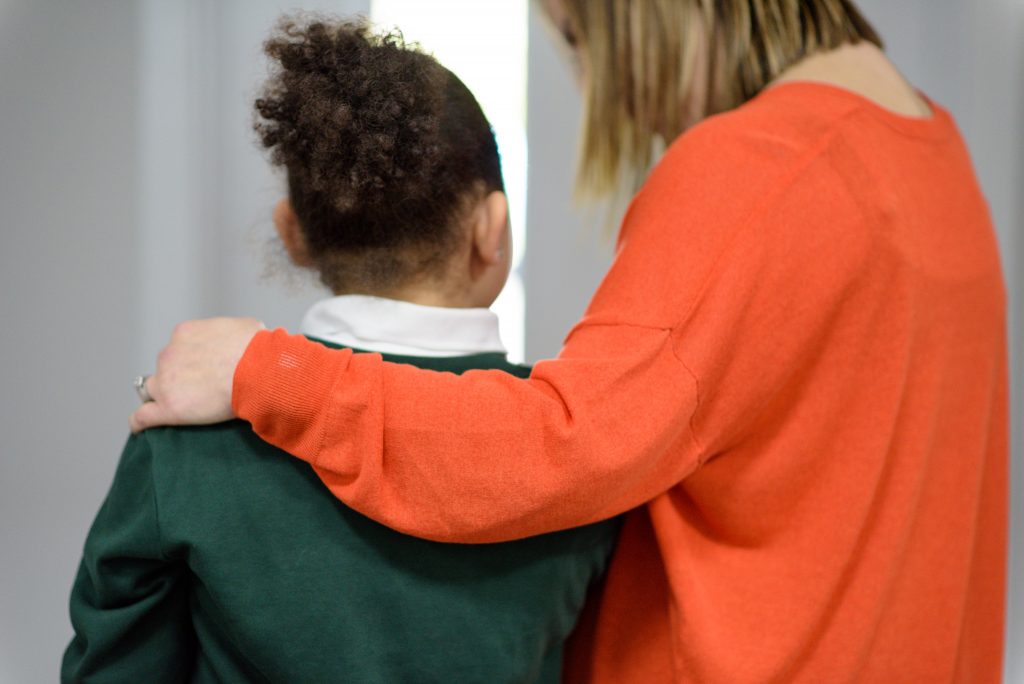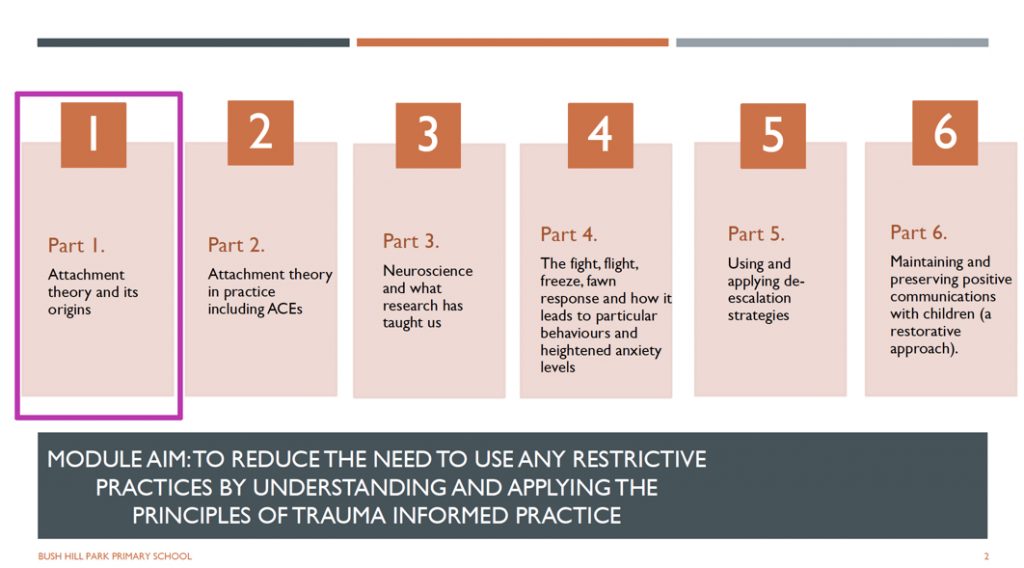NFPS Certificate in Trauma Informed Practice (Online Course)

50% Discount Launch Price of £147 + Vat
This Offer Has Now Ended
What is Trauma Informed Practice?
The ultimate aim of trauma informed practice is to raise awareness amongst all staff to understand that all behaviour is a form of communication. Some children may not have the vocabulary to explain or may be too scared to articulate what has happened to them. It is about thinking differently with empathy and understanding, whilst prioritising the well-being of all.
A trauma informed school is one that approaches all interactions as an opportunity to strengthen relationships and to foster positive thinking habits.
Watch This Video To See An Overview of The Course
Why is Trauma Informed Practice Important?
Physical restraint, isolation and forced punitive consequences are still a regular feature of the way that children’s behaviour is managed in many schools in the UK today.
As a result, staff may unknowingly approach challenging behaviour with strategies that are reminiscent of the child’s original abuse.
This only serves to breakdown relationships between staff and children, leaving staff feeling overwhelmed and only deepens the child’s physical and emotional distress.
Such experiences worsen a child’s chances of lasting recovery, not least because they discourage or altogether stop them from seeking support again in the future.
Trauma informed practice helps staff understand the root of the child’s behaviour and if used as a whole organisational approach can reduce the need to use any further restrictive practice.
In summary, a trauma-informed organisational approach towards reducing restrictive practices pursues an approach in all areas to prevent the replication of traumatic experiences.
Course Aim:
To reduce the need to use any restrictive practices by understanding and applying the principles of Trauma Informed Practice.

Course Overview:
By the end of this course you will understand:
- Attachment theory and its origins;
- Attachment theory in practice (including an overview of secure and insecure attachments);
- Neuroscience and what research has taught us;
- The Fight, Flight and Freeze Response and How It Leads to particular Behaviours and heightened anxiety levels in children;
- Using and applying de-escalation strategies;
- Maintaining and preserving positive communications with children (a restorative approach)

Restraint Reduction Feedback - How Trauma Informed Practice Actually Works!


A 70% Reduction in Restraint! - Proof of how Trauma Informed Practice has reduced restraint since it has been implemented
“The number of incidents logged on our monitoring system has significantly reduced over the course of the last two years.
The picture of physical intervention in our school two years ago was not an effective or productive picture.
The learning mentors were responding to calls on walkie talkies and senior leaders were continually called out of meetings to intervene with behaviour.
Staff, teachers in particular, did not feel like they could always deal with behaviour incidents and would call on help.
This led to unnecessary and very often avoidable physical intervention from staff members, it damaged the relationships between children and senior leaders and learning mentors as they were continually used to impart punitive consequences, to remove children from class or where behaviour had escalated beyond all reasonable control physical intervention to prevent children hurting themselves or others.
This cycle of negative response to behaviour had no impact on reducing the incidents as children were not being equipped with the tools to self-regulate, they did not feel listened to or understood and they were heightening the emotions of children around them who then saw this as a legitimate way to respond.
As a result, physical intervention was taking place daily and, in some cases, multiple times within a day.
We are now in a position where physical intervention is rarely used. In the last month, there has been one physical intervention with a child who has SEND who was hurting themselves and the intervention simply took the form of a hand placed over a cupboard so they could not hurt their head.
This is the position we are now in as a direct result of being a TIP school.
Learning mentors no longer deal with behaviour issues, long gone are the walkie talkies, as staff now have the confidence to interact positively with children when dealing with behaviour.
Where before the learning mentors were on patrol responding to ‘red cards’ they now have a consistent timetable of mentoring sessions which again has meant there is positive intervention and interaction before a situation can escalate.
Senior leaders now have positive interactions with children across the school because they are no longer having children sent to them as a ‘punishment’, but children are sent to senior leaders daily to show them good work or to tell them about something positive they have done or said that day, again this has only sought to strengthen the relationships and the trust that children have in adults across the school.
The approach we use is a preventative one and our belief is that ‘Every interaction is an intervention’.
As a result of being a Trauma Informed School, restraint reduction has continued to decrease significantly and physical intervention has reduced by around 70%.”

An outline on how the impact of Trauma Informed Practice has improved the life of the children in one school
“The impact of TIP on the children in our school has been far reaching.
The communication and relationships that they have with staff members has strengthened since we implemented our programme of training.
Children know that they will be listened to.
Not only has it ensured that our staff are consistently calm in their reactions to children’s behaviour but it has enabled children to further develop their confidence and trust in staff as they know that staff will always respond to them with kindness and will not seek to call on them publicly or embarrass them for their behaviour.
This has led to greatly reduced incidents of low-level behaviour across the school where children no longer seek to communicate in this way as they now have the strategies and relationships to communicate on their terms.
Given the restorative approach, children know that regardless of the behaviour demonstrated that they will always be listened to and will have the opportunity to be heard and will not be accused of anything.
Most importantly, children have trust in the adults around them that they can make mistakes with their behaviour and it remains an experience that they can learn from, by reflecting on this and taking part in restorative conversations, it does not label them as ‘naughty’ or ‘difficult’ and the staff consistently reiterate that they know the good in children and know what they are capable of (this forms part of our micro-script as it is important that children do not lose self-esteem through addressing behaviour concerns when they arise).
We only ever speak about the behaviour and not the child. The two do not go hand in hand.
Since initiating our TIP we have had no exclusions in our school (both fixed-term and permanent).
Academic achievement has been difficult to measure due to the pandemic, but given our extremely deprived circumstances, the resilience of children has not diminished and their confidence and comfort in school returned almost immediately and we put this down to the trust they have in staff and the knowledge that they are treated with understanding and respect regardless of the behaviours that they demonstrate.
Children are equipped with a tool-box of strategies that they can draw on if they find themselves in difficult circumstances.
All achievements are recognised, children know that all achievements they make, no matter the size will be recognised, this supports growth in their emotional resilience, pride, self-esteem and confidence and it has empowered children to talk about their feelings and emotions confidently with trusted adults, and they all have trusted adults across the school that they know they can talk to ranging from office staff, dinner ladies, learning mentors, support staff, teachers and senior leadership – this is because all members of staff have been trained to approach with understanding and respect for the child.
Children are confident that the safety of their physical, social and emotional well-being will be a priority for any staff member.”

Other Testimonials From Staff Who Have Taken Part In The Training
These are testimonials from staff who have taken part in this course when asked to summarise what they will take from this training:
“You cannot plan for behaviour – be flexible.”
“Come in with a positive, calm and considerate approach. Giving even more time and patience to all children.”
“I feel prepared for the barriers children will enter with.”
“The importance of my response and position.”
“I now have the ability to understand trauma in children and support it with a positive attitude and skills.”
“Strategies for building relationships with and instilling confidence in the children that I will be teaching.”
“Understanding, patience and love, with myself and the children.”
“Consistency, care and patience.”
“Your behaviour and responses shapes how your class behave. Ensure the best approach is always taken with patience and care at the forefront of your mind.”
“Inspired by new ways of teaching and supporting children through their traumas.”
“Well-being is the priority.”
“Pro-activeness.”
“Confidence.”
“Feeling supported in my duty to support the children.”
“Prepared for the challenges of my role and responsibility in supporting children.”
“Using the cues to assist/ support children when they are feeling a certain way.”
“Awareness, kindness, patience and the ability to go forward at the best of my capabilities.”
“An improved way of presenting information to children which also enables them to communicate more effectively with teachers and support staff.”
“Skills to use positivity and feeling prepared.”
“I feel supported to find the best possible way of learning and supporting our children.”
“Every interaction is intervention really stood out to me and thinking about how every interaction I have with a child has an impact and making sure that the impact is positive.”
“Confirms underlying school ethos and prepares us well for coping with pupil’s individual experiences … and how there is no correct route to supporting children, you respond to what is presented and address in the way that you feel is appropriate to the individual needs of that child.”
“To ensure the children that I work with know that I will work hard to ensure I never unwittingly contribute to traumas they have faced with my interactions with them – and to ensure that I use every interaction as an opportunity to strengthen the trust and relationships built.”
